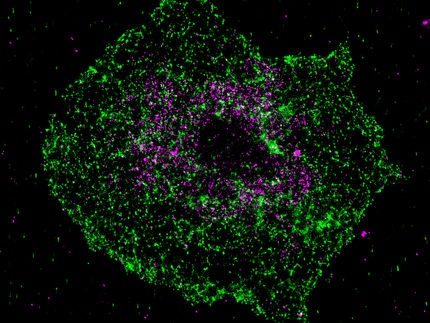Enzyme may be a key to Alzheimer's-related cell death
A Purdue University researcher has discovered that the amount of an enzyme present in neurons can affect the mechanism thought to cause cell death in Alzheimer's disease patients and may have applications for other diseases such as stroke and heart attack.
Sandra Rossie, a professor of biochemistry, found that increasing the amount of protein phosphatase 5, or PP5, in rat neural cells resulted in less cell death associated with reactive oxygen species, which chemically damage cell molecules. Conversely, decreasing PP5 caused greater cell death. The results of Rossie's study are published in the Journal of Neurochemistry .
Rossie's lab found that PP5 overexpression prevents neuronal death by amyloid beta and shuts off the stress pathways. When reactive oxygen that wasn't created by amyloid beta was used on the cells, the results were the same. In contrast, neurons with reduced PP5 are more sensitive to death caused by amyloid beta.
"That suggests to us that PP5 protects neurons from cell death induced by reactive oxygen species, not just the presence of amyloid beta," Rossie said. "This means that PP5 may protect against other health problems involving reactive oxygen species as well, such as stroke and heart attacks."
It is possible, Rossie said, that finding a way to increase PP5 activity could help prevent the loss of neurons by amyloid beta. Rossie said PP5 also could play a role in inhibiting other responses of neurons to amyloid beta. Her lab will work to determine which pathways PP5 affects, and which of those is most responsible for neural protection by PP5.
Topics
Organizations
Other news from the department science

Get the life science industry in your inbox
By submitting this form you agree that LUMITOS AG will send you the newsletter(s) selected above by email. Your data will not be passed on to third parties. Your data will be stored and processed in accordance with our data protection regulations. LUMITOS may contact you by email for the purpose of advertising or market and opinion surveys. You can revoke your consent at any time without giving reasons to LUMITOS AG, Ernst-Augustin-Str. 2, 12489 Berlin, Germany or by e-mail at revoke@lumitos.com with effect for the future. In addition, each email contains a link to unsubscribe from the corresponding newsletter.
Most read news
More news from our other portals
Last viewed contents
Eckert & Ziegler: Major Order for Prostate Implants
Category:Human_reproduction
BioCity Nottingham - Nottingham, United Kingdom
Acute_myeloid_leukemia
Deer_Horn_Knives
Lamina_(anatomy)
St._John_Ambulance
Atkins_Nutritional_Approach
Category:Emergy
St._Jude_Children's_Research_Hospital_(Memphis,_Tennessee)


















































